Your kidneys work hard to filter alcohol from your blood, and drinking too much can harm these vital organs[1] over time. When someone stops drinking alcohol, their kidneys begin a recovery process that can lead to significant health improvements.
Stopping alcohol allows the kidneys to reduce inflammation, improve filtration, and restore normal blood pressure regulation within days to weeks. The kidneys no longer have to process the toxic effects of alcohol, which means they can focus on their essential jobs like filtering waste and balancing fluids in the body.
People who quit drinking often see improvements in kidney function, blood pressure, and overall health. The extent of recovery depends on how much damage occurred before stopping and how long someone drank heavily.
Key Takeaways
- Kidney function begins improving within days of stopping alcohol as inflammation decreases and blood pressure normalizes
- Long-term recovery can restore significant kidney health, especially for those without permanent damage
- Supporting kidney recovery requires proper hydration, healthy eating, and regular medical monitoring
How Alcohol Affects Kidney Health
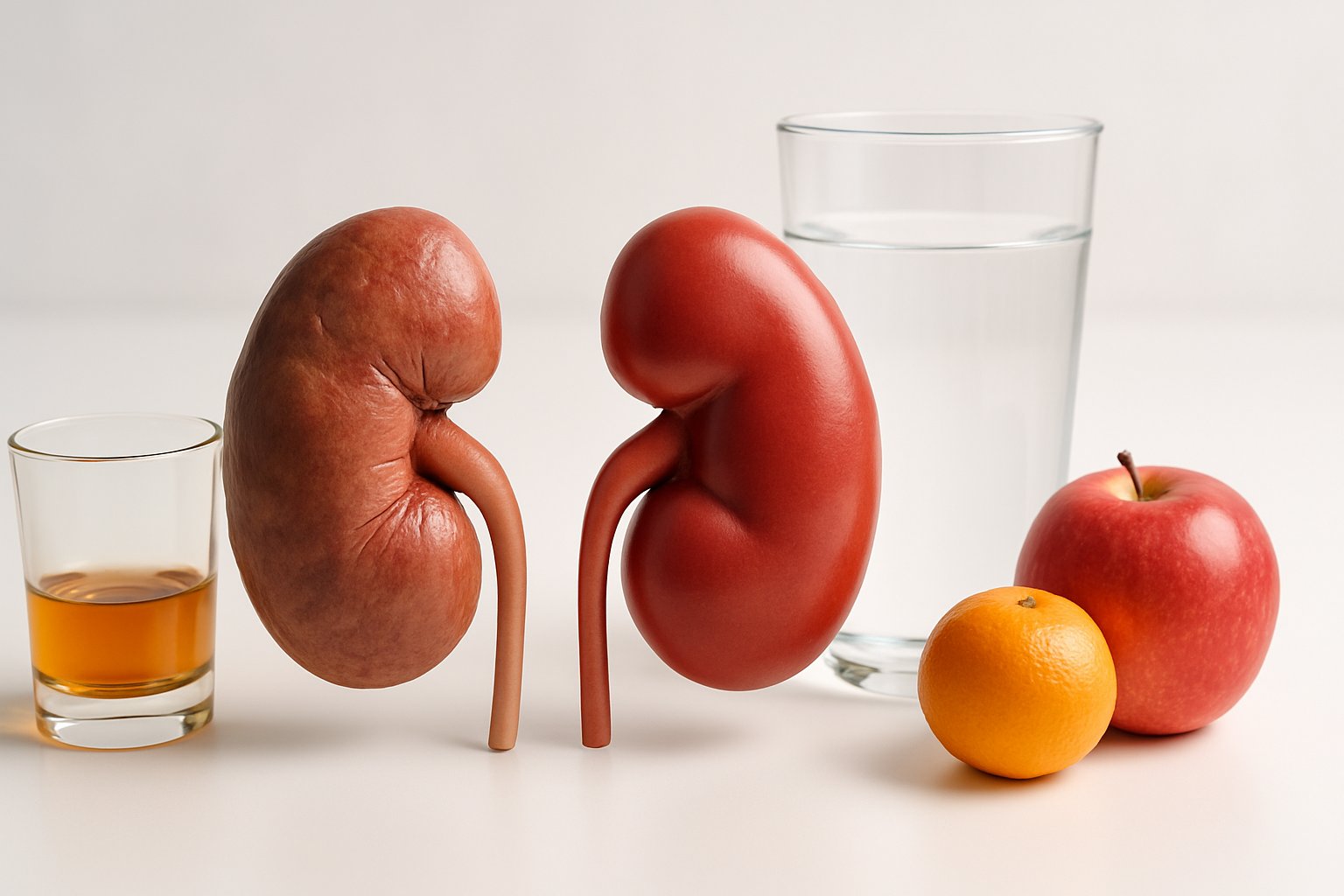
Alcohol directly impacts how kidneys filter blood and maintain fluid balance in the body. Heavy drinking doubles the risk for kidney disease[1] and can cause both immediate and lasting damage to kidney function.
Kidney Function and Alcohol Metabolism
The kidneys work as the body’s main filtration system, removing waste products and toxins from the blood. When someone drinks alcohol, the kidneys must process and filter this substance along with other waste materials.
Alcohol causes changes in kidney function[1] and makes them less able to filter blood effectively. This happens because alcohol interferes with the normal cellular processes that keep kidneys working properly.
The kidneys also control water balance in the body. Alcohol affects this important job by acting as a diuretic, which means it increases urine production.
Key effects on normal kidney function:
- Reduced blood filtration ability
- Disrupted water balance regulation
- Impaired waste removal processes
- Altered hormone production that controls blood pressure
Short-Term Effects on Kidneys
Drinking alcohol creates immediate stress on kidney function, even after just one drinking session. The most serious short-term risk is acute kidney injury (AKI).
Binge drinking can cause acute kidney injury[2] when blood alcohol levels rise to dangerous amounts. This typically happens when someone drinks four to five drinks within two hours.
AKI makes kidney function drop suddenly and severely. People with this condition often need dialysis treatment until their kidneys start working normally again.
Immediate effects include:
- Dehydration and electrolyte imbalances
- Increased blood pressure
- Reduced urine production
- Blood toxin buildup
Most people recover from AKI completely. However, some cases lead to permanent kidney damage that increases the risk of chronic kidney disease later.
Long-Term Damage and Risks
Regular heavy alcohol consumption creates lasting problems for kidney health. Heavy drinking doubles the risk for kidney disease[1] compared to people who drink lightly or not at all.
Chronic alcohol use damages kidneys through multiple pathways. It causes high blood pressure, which is one of the leading causes of kidney disease.
Heavy drinking definitions:
- Women: More than 3 drinks per day or 7 per week
- Men: More than 4 drinks per day or 14 per week
Alcohol also causes liver disease in long-term drinkers. When the liver stops working properly, it puts extra strain on the kidneys because they have to work harder to maintain proper blood flow and filtration.
The combination of liver disease and kidney problems is common in people with alcohol dependence. This creates a cycle where each organ’s damage makes the other work less effectively.
Long-term risks include:
- Chronic kidney disease progression
- High blood pressure development
- Liver-kidney syndrome
- Need for dialysis or transplant
Immediate Changes in Kidney Function After Stopping Alcohol
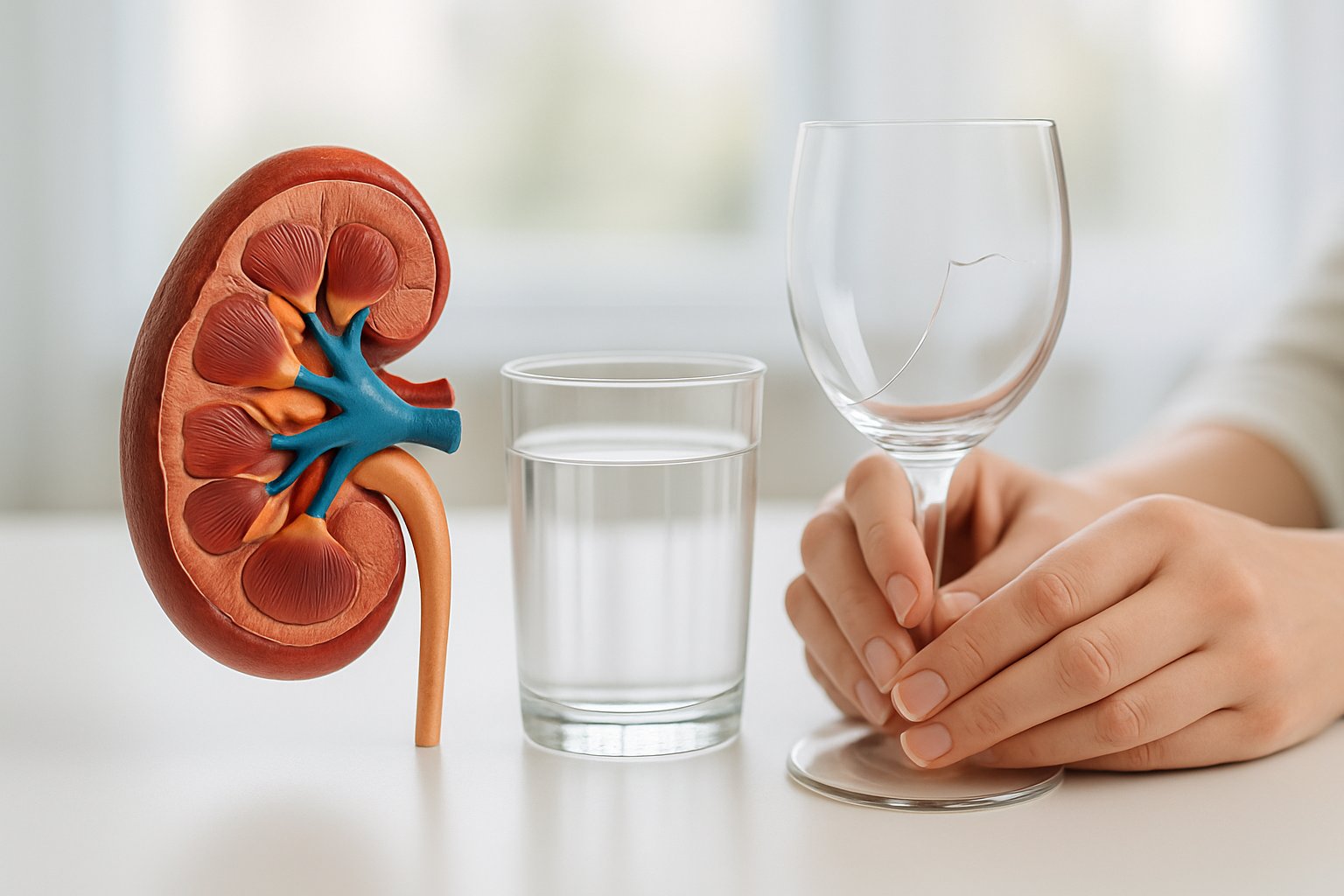
Your kidneys begin adapting within hours of quitting alcohol as they shift from processing alcohol toxins to focusing on normal filtration and fluid balance. Blood pressure starts stabilizing and hydration levels improve as the body reestablishes healthy fluid regulation.
Detoxification and Waste Removal
When someone stops drinking alcohol, their kidneys immediately begin working more efficiently. Alcohol forces the kidneys to work overtime processing toxins and acetaldehyde.
Without alcohol, the kidneys can focus on their main job of filtering waste from the blood. This shift happens within 6 to 12 hours after the last drink.
The filtering units called nephrons start working better. They can remove toxins, excess salts, and waste products more effectively.
Key improvements include:
- Better removal of urea and creatinine
- More efficient filtering of toxins
- Reduced stress on kidney cells
- Improved blood flow through kidney tissue
People may notice clearer urine and less frequent urination as the kidneys stop being overstimulated. The organs can now maintain proper electrolyte balance without alcohol disrupting their normal processes.
Hydration Improvement
Alcohol acts as a diuretic, causing the body to lose more water than it takes in. When people quit drinking, their hydration levels start improving right away.
The kidneys stop producing excess urine within 24 to 48 hours. This happens because alcohol blocks antidiuretic hormone (ADH), which helps the body retain water.
Without alcohol blocking this hormone, the kidneys can hold onto water better. They start concentrating urine properly instead of producing large amounts of dilute urine.
Hydration benefits include:
- Better fluid retention
- Improved electrolyte balance
- Less frequent urination
- Better skin moisture
Dehydration symptoms like headaches and fatigue often improve within the first few days. The kidneys can now regulate sodium and potassium levels more effectively.
Blood Pressure Stabilization
High blood pressure from alcohol use begins dropping within days of stopping drinking. The kidneys play a major role in controlling blood pressure through fluid balance.
Alcohol raises blood pressure by affecting hormones that control fluid retention. When someone quits alcohol, these hormone levels start returning to normal.
The kidneys can better regulate the renin-angiotensin system, which controls blood pressure. This system helps manage how much fluid the body keeps or releases.
Blood pressure improvements:
- Lower systolic and diastolic readings
- Better fluid balance regulation
- Reduced strain on blood vessels
- Improved kidney blood flow
Most people see blood pressure improvements within one to two weeks of quitting alcohol. Blood pressure and liver function return to normal after 30 days[3] for most people who stop drinking.
Recovery of Kidney Health in the Weeks and Months After Quitting
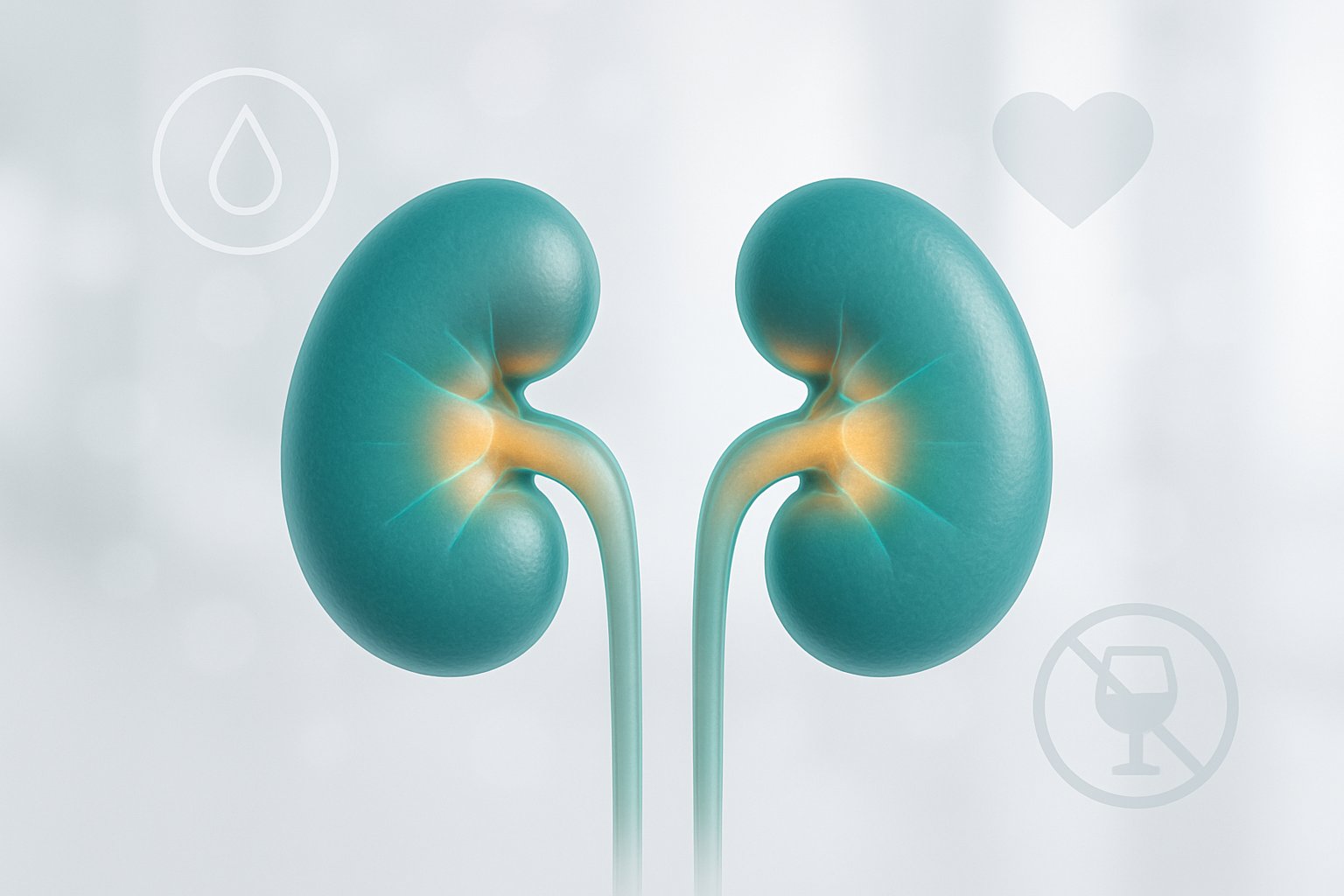
The kidneys begin healing within days of stopping alcohol consumption, with inflammation decreasing and blood pressure stabilizing. Fluid balance improves significantly as the kidneys regain their ability to process water and electrolytes properly.
Reduction in Inflammation
Alcohol causes direct inflammation to kidney tissues through toxic metabolites and oxidative stress. When someone quits drinking, inflammatory markers in the kidneys drop within the first week.
Acute inflammation subsides first. The kidneys stop processing alcohol’s harmful byproducts like acetaldehyde. This reduces cellular damage and allows repair processes to begin.
Chronic inflammation takes longer to resolve. People who drank heavily for years may need several months for complete healing. The inflammatory response gradually returns to normal levels.
Key anti-inflammatory changes include:
- Reduced cytokine production in kidney cells
- Lower oxidative stress throughout the nephrons
- Decreased tissue swelling in the glomeruli
- Improved cellular repair mechanisms
Blood tests often show decreasing creatinine levels within 2-4 weeks. This indicates better kidney function as inflammation reduces.
Enhanced Fluid and Electrolyte Balance
Alcohol disrupts the kidneys’ ability to maintain proper hydration and mineral balance. Stopping alcohol consumption allows these systems to normalize gradually.
Hydration improves within days. Alcohol blocks antidiuretic hormone (ADH), causing excessive urination. Without alcohol, ADH function returns to normal and the kidneys retain appropriate amounts of water.
Electrolyte regulation stabilizes over weeks. The kidneys regain control over sodium, potassium, and magnesium levels. Many people notice reduced muscle cramps and fatigue as these minerals balance out.
Blood pressure often decreases as fluid balance improves. High blood pressure from alcohol use puts strain on kidney blood vessels. Improved blood pressure and heart health[4] occurs as the cardiovascular system recovers.
Common improvements include:
- More consistent urine output
- Better sodium retention
- Stable potassium levels
- Reduced ankle swelling
Improved Filtration Efficiency
The kidneys’ primary job involves filtering waste products from blood through tiny units called nephrons. Alcohol damages these structures, but they can recover significantly after quitting.
Glomerular filtration rate increases. This measures how well kidneys filter blood. Many people see improvements in GFR within 4-8 weeks of stopping alcohol consumption.
Protein in urine decreases. Healthy kidneys prevent protein from entering urine. Alcohol damage allows protein to leak through, but this often reverses with sustained sobriety.
Waste removal becomes more efficient. The kidneys better eliminate toxins, medications, and metabolic byproducts. Blood tests typically show:
| Marker | Improvement Timeline |
|---|---|
| Creatinine | 2-6 weeks |
| Blood urea nitrogen | 2-4 weeks |
| Proteinuria | 1-3 months |
Nephron regeneration occurs slowly. While damaged kidney cells cannot fully regenerate, remaining healthy nephrons often compensate by working more efficiently. This functional improvement can continue for many months after quitting alcohol.
Long-Term Kidney Outcomes and Disease Progression
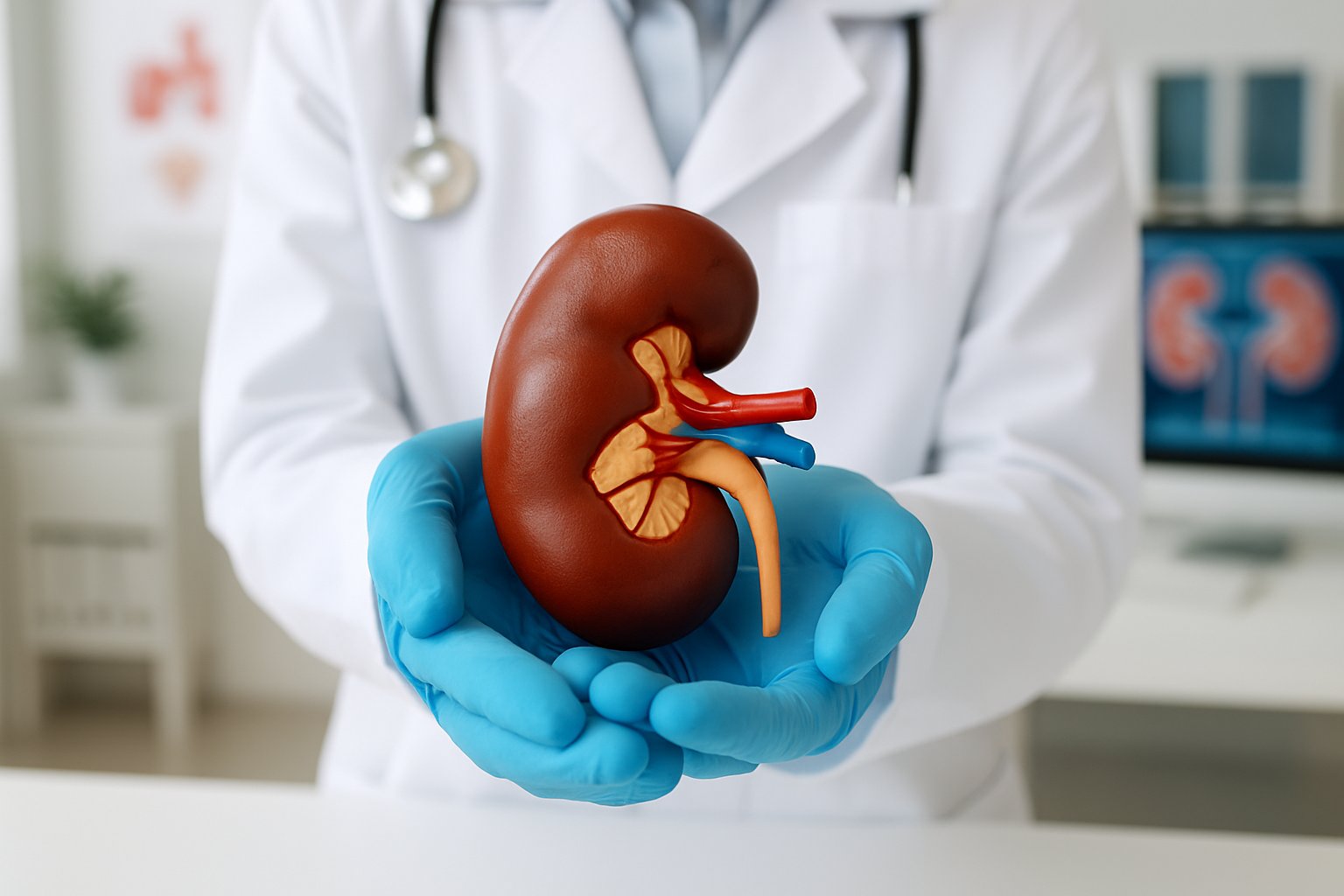
Stopping alcohol consumption creates measurable changes in kidney function over months and years. The kidneys begin filtering blood more effectively, blood pressure often improves, and the risk of developing chronic kidney disease decreases significantly.
Risk of Chronic Kidney Disease
Heavy drinking doubles the risk for kidney disease[1] compared to moderate or no alcohol use. People who consume more than four drinks daily face the highest risk of developing chronic kidney disease.
When someone quits alcohol, their kidneys experience less daily stress. The organs no longer need to filter alcohol toxins from the blood. This reduced workload allows kidney cells to function more normally.
Risk Reduction Timeline:
- 1-3 months: Blood pressure begins stabilizing
- 6-12 months: Kidney filtration rates improve
- 1-2 years: Risk of chronic kidney disease decreases significantly
People with existing kidney problems see faster improvements. Their kidney function often stabilizes within the first year of quitting alcohol. Some individuals experience partial recovery of lost kidney function.
Blood pressure improvements play a major role in kidney protection. High blood pressure damages tiny blood vessels in the kidneys. When alcohol consumption stops, blood pressure typically drops within weeks.
Prevention of Further Kidney Damage
Quitting alcohol stops the cycle of ongoing kidney damage. The kidneys can focus on their normal jobs instead of processing alcohol toxins. This change helps prevent the progression from mild kidney problems to chronic kidney disease.
Key Protection Benefits:
- Improved blood flow to kidneys
- Better fluid balance in the body
- Reduced inflammation in kidney tissues
- Lower risk of acute kidney injury
People who stop drinking before developing chronic kidney disease have excellent outcomes. Their kidneys often return to normal function within months. Early intervention prevents permanent damage to kidney structures.
The kidneys’ ability to maintain proper water balance improves dramatically. Alcohol disrupts this critical function by affecting hormone levels. Without alcohol, the kidneys regulate body fluids more effectively.
Relationship With Liver Health
Liver disease and kidney problems often occur together in people who drink heavily. Most patients with both liver disease and kidney dysfunction are alcohol dependent[1]. This connection makes quitting alcohol especially important.
Fatty liver develops first, often within weeks of heavy drinking. If drinking continues, this can progress to cirrhosis. Advanced liver disease puts enormous strain on the kidneys.
Liver-Kidney Connection:
- Liver controls blood flow to kidneys
- Cirrhosis disrupts normal kidney function
- Liver toxins can damage kidney cells
- Both organs work together to filter blood
When someone stops drinking, the liver begins healing within days. Early-stage fatty liver can reverse completely within months. This liver recovery directly benefits kidney function.
The kidneys receive more consistent blood flow as liver health improves. Liver scarring from cirrhosis cannot be reversed, but stopping alcohol prevents further damage. This stabilization helps protect remaining kidney function.
People with both liver and kidney problems who quit alcohol often avoid dialysis. Their kidney function may stabilize even if it doesn’t fully recover.
Other Physical and Psychological Effects Related to Kidney Recovery
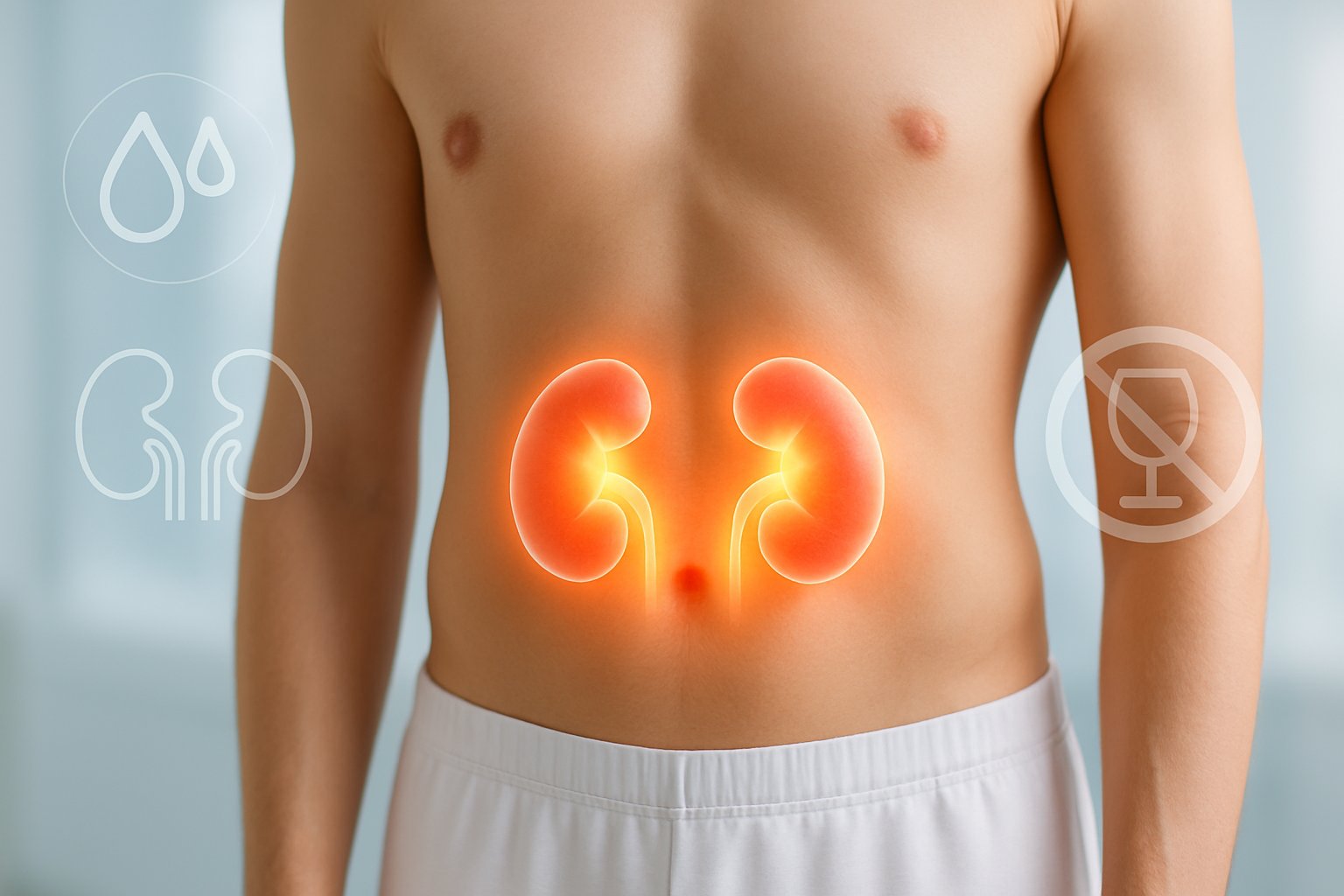
When people stop drinking alcohol, their kidneys begin healing alongside other body systems. This recovery process affects appetite patterns, mental health conditions like depression and anxiety, and immune system strength.
Appetite and Weight Changes
Alcohol cessation triggers significant changes in appetite and eating patterns. Many people experience increased hunger during the first few weeks as their body adjusts to functioning without alcohol’s appetite-suppressing effects.
Initial appetite fluctuations often occur within 3-7 days of stopping alcohol. Some people feel constantly hungry while others lose interest in food completely. These changes happen because alcohol affects hormones that control hunger and fullness.
Weight changes during kidney recovery vary by person:
- Weight loss: Common in the first month due to reduced calorie intake from alcohol
- Water weight reduction: Decreased bloating as kidneys process fluids more effectively
- Muscle mass recovery: Better protein processing supports muscle rebuilding
- Fat distribution changes: Less belly fat accumulation over time
The kidneys play a key role in these changes. As kidney function improves, the body processes nutrients more efficiently. This leads to better absorption of vitamins and minerals that support healthy weight management.
People often notice their taste preferences change too. Foods may taste different or more appealing as the body recovers from alcohol’s effects on taste buds and digestion.
Mental Health: Depression and Anxiety
Stopping alcohol creates complex effects on mental health during kidney recovery. The brain and kidneys work together to maintain chemical balance, so improvements in kidney function can influence mood and anxiety levels.
Depression symptoms may initially worsen before improving. This happens because alcohol withdrawal affects brain chemicals like serotonin and dopamine. However, as kidney function improves and toxins clear from the body, many people experience better mood stability.
Common mental health changes include:
| Timeline | Depression Effects | Anxiety Effects |
|---|---|---|
| Week 1-2 | May increase temporarily | Often peaks during withdrawal |
| Month 1-3 | Gradual improvement begins | Episodes become less frequent |
| Month 3+ | Notable mood stabilization | Significant anxiety reduction |
Anxiety levels often fluctuate during early recovery. Better kidney function helps remove stress hormones from the blood more effectively. This leads to reduced physical anxiety symptoms like rapid heartbeat and sweating.
Emotional health and kidney disease[5] are closely connected. As kidney recovery progresses, many people find it easier to manage stress and maintain emotional balance.
Sleep quality improvements also support better mental health. Healthier kidneys help regulate hormones that control sleep cycles, leading to more restful nights and improved daytime mood.
Immune System and Infection Risk
Alcohol cessation strengthens the immune system as kidney function improves. Healthy kidneys help remove waste products and toxins that can weaken immune responses.
Infection resistance increases significantly within weeks of stopping alcohol. The kidneys produce hormones that support white blood cell function. When kidney health improves, these immune cells work more effectively to fight off bacteria and viruses.
Key immune system improvements include:
- Faster wound healing due to better blood filtration
- Reduced urinary tract infections as kidney function normalizes
- Stronger response to vaccines and better antibody production
- Less frequent colds and flu from improved overall immunity
Inflammation levels decrease as kidney recovery progresses. Alcohol causes chronic inflammation that affects the entire body. As kidneys heal, they better regulate inflammatory processes throughout the body.
The relationship between kidney health and immunity affects daily life. People often notice they get sick less often and recover more quickly from minor illnesses.
Better kidney function also improves the body’s ability to process medications. This means immune-supporting supplements and treatments work more effectively during recovery.
Relationships with family and friends often improve as people feel physically healthier and mentally stronger. The combination of better kidney function, improved mood, and stronger immunity creates positive changes that extend beyond physical health.
Challenges During Alcohol Withdrawal
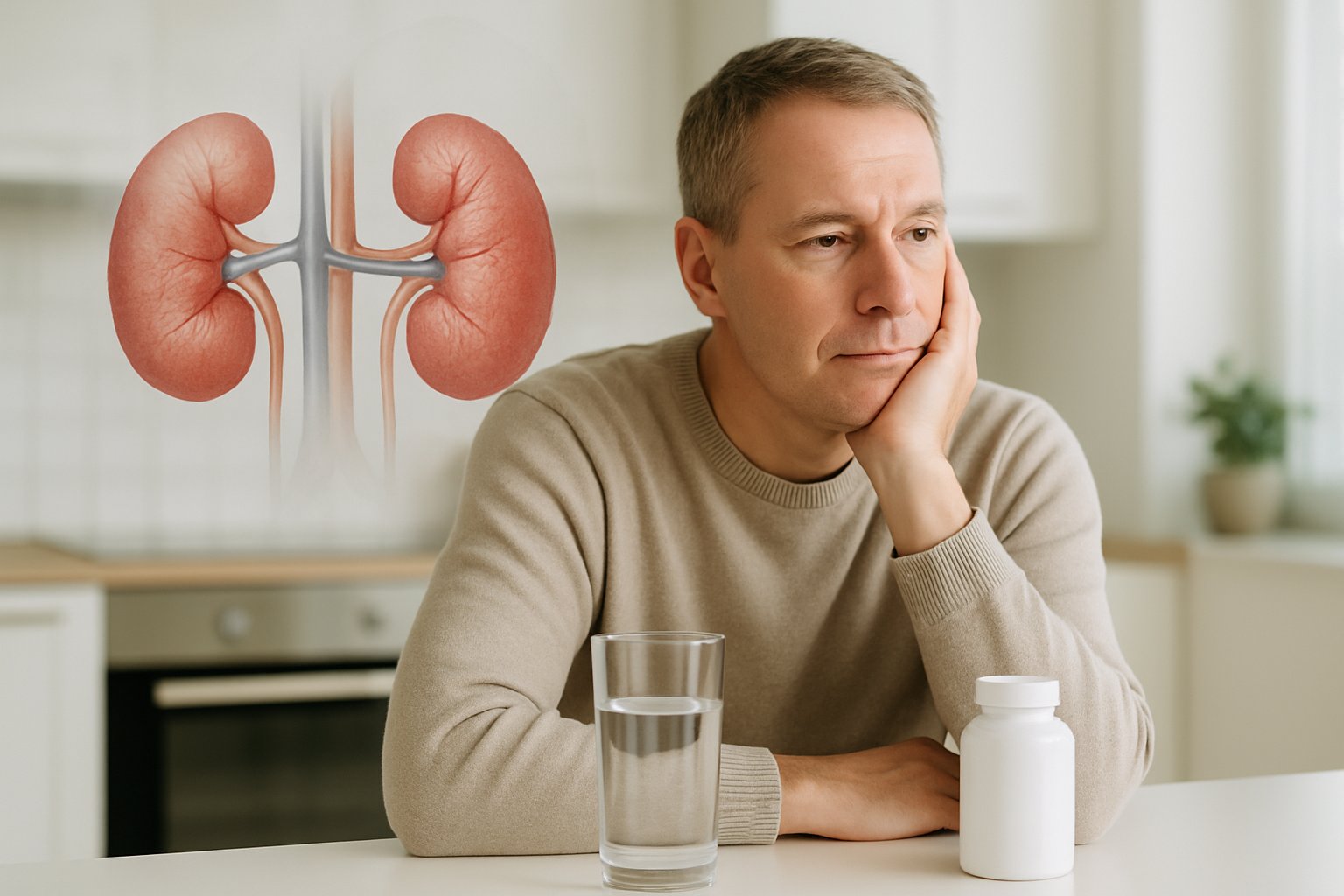
Stopping alcohol after heavy drinking can cause serious withdrawal symptoms that affect the whole body. These symptoms range from mild discomfort to life-threatening conditions that need medical care.
Common Withdrawal Symptoms
Alcohol withdrawal symptoms usually start within 6 to 24 hours after the last drink. The body has become used to alcohol and struggles to work normally without it.
Physical symptoms include shaking hands, sweating, headaches, and nausea. Many people also feel very tired or have trouble sleeping.
Mental symptoms can be just as hard to handle. People often feel anxious, sad, or confused during withdrawal.
The symptoms get worse during the first few days. Most physical symptoms start to get better after 3 to 7 days.
People who drank heavily for months or years often have stronger withdrawal symptoms. Their bodies need more time to adjust to working without alcohol.
Some people also have cravings for alcohol during this time. These feelings can make it hard to stay committed to quitting.
Risk of Delirium Tremens
Delirium tremens is the most dangerous type of alcohol withdrawal. It happens in about 3 to 5 percent of people going through withdrawal.
This condition causes severe confusion and can be deadly without treatment. People may see or hear things that are not there.
Warning signs include:
- High fever
- Fast heart rate
- Extreme confusion
- Seizures
- Heavy sweating
Delirium tremens usually starts 2 to 4 days after stopping alcohol. People who drank very heavily for years have the highest risk.
Those with past seizures or withdrawal episodes are also more likely to develop this condition. Medical problems like infections can make the risk even higher.
Medical Support and Monitoring
Professional medical care makes alcohol withdrawal much safer. Doctors can watch for serious problems and treat symptoms as they happen.
Hospitals and detox centers provide 24-hour monitoring. Medical staff check vital signs and watch for signs of delirium tremens.
Medications can help with withdrawal:
- Benzodiazepines reduce seizure risk
- Anti-nausea drugs help with stomach problems
- Sleep aids help with insomnia
IV fluids help prevent dehydration during withdrawal. Vitamins, especially B vitamins, help the body heal from alcohol damage.
Support groups can provide emotional help during this difficult time. Many people find it easier to quit with help from others who understand their struggles.
Medical supervision is especially important for people who have tried to quit before or have other health problems.
Lifestyle Strategies to Support Kidney Recovery

Supporting kidney recovery after stopping alcohol requires focused attention on hydration, blood pressure control, and ongoing medical monitoring. These three areas work together to create the best environment for kidney healing and long-term health.
Hydration and Nutrition
Proper hydration helps kidneys flush out toxins and waste products more effectively. Adults should drink 8-10 glasses of water daily, though this amount may vary based on individual needs and medical conditions.
Water intake should be spread throughout the day rather than consumed all at once. This steady approach reduces strain on recovering kidneys.
Key hydration tips:
- Start each morning with a glass of water
- Keep a water bottle nearby as a visual reminder
- Monitor urine color – pale yellow indicates good hydration
Nutrition plays an equally important role in kidney recovery. A kidney-friendly diet limits sodium, processed foods, and excessive protein while emphasizing fresh fruits and vegetables.
Sodium intake should stay below 2,300 mg per day. Reading food labels helps identify hidden sodium in packaged foods, sauces, and restaurant meals.
Potassium-rich foods like bananas, oranges, and spinach support kidney function when consumed in moderation. However, people with advanced kidney disease may need to limit potassium intake under medical guidance.
Blood Pressure Management
High blood pressure damages kidney blood vessels and slows recovery. Managing underlying conditions like blood pressure[6] helps protect kidney function during the healing process.
Regular exercise strengthens the cardiovascular system and naturally lowers blood pressure. Even 30 minutes of walking five days per week provides significant benefits.
Effective blood pressure strategies:
- Monitor readings at home with a digital cuff
- Reduce salt intake to less than 1,500 mg daily if recommended
- Practice stress-reduction techniques like deep breathing
- Take prescribed medications consistently
Weight management also impacts blood pressure control. Losing even 5-10 pounds can lead to meaningful blood pressure reductions in overweight individuals.
Sleep quality affects blood pressure regulation. Adults should aim for 7-9 hours of quality sleep each night to support overall cardiovascular health.
Regular Check-Ups and Support Networks
Consistent medical monitoring tracks kidney recovery progress and catches potential problems early. Blood tests measuring creatinine and estimated glomerular filtration rate (eGFR) show how well kidneys are filtering waste.
Healthcare appointments should occur every 3-6 months initially, then annually once kidney function stabilizes. These visits allow doctors to adjust medications and lifestyle recommendations as needed.
Support groups provide emotional assistance and practical advice during recovery. Many people find that sharing experiences with others who understand addiction challenges improves their success rates.
Support options include:
- Alcoholics Anonymous meetings
- Online recovery communities
- Family counseling sessions
- Peer support programs
Support networks and lifestyle changes[7] work together to prevent further kidney decline and maintain sobriety.
Professional counseling addresses underlying factors that contributed to alcohol use. Mental health support reduces relapse risk and helps people develop healthier coping mechanisms.
Regular participation in support activities creates accountability and reduces isolation during recovery.
Frequently Asked Questions
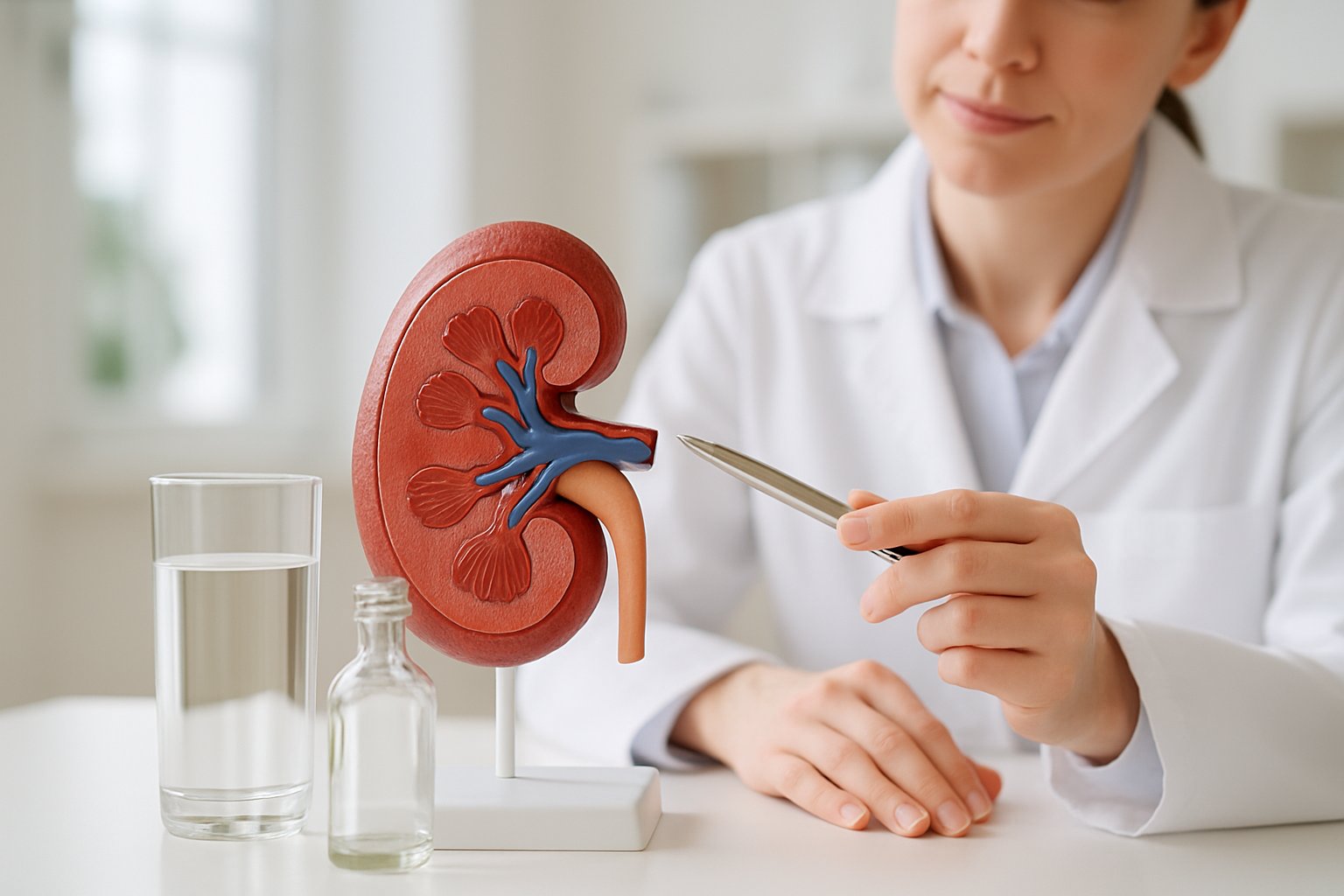
People who quit drinking often wonder about their kidney recovery timeline and what improvements they can expect. The healing process depends on factors like previous damage levels, overall health, and how long someone consumed alcohol regularly.
Can kidney function improve after quitting alcohol?
Yes, kidney function can improve significantly after stopping alcohol consumption. The kidneys have a remarkable ability to heal themselves when the source of damage is removed.
Within weeks of quitting, many people see improvements in their kidney’s filtering ability. Alcohol affects the kidneys’ ability to filter blood and maintain proper water balance[1], so stopping allows these functions to recover.
The extent of improvement depends on how much damage occurred before quitting. People with mild kidney damage typically see better recovery than those with severe, long-term damage.
Blood pressure often decreases after quitting alcohol. This reduction helps protect the kidneys from further damage and allows existing damage to heal.
What are the signs of kidney recovery after cessation of alcohol intake?
Improved urine output is often one of the first signs of kidney recovery. People may notice their urine becomes clearer and less concentrated.
Reduced swelling in the legs, ankles, and face indicates better kidney function. This happens because the kidneys can better regulate fluid balance in the body.
Blood pressure readings may start to normalize within several weeks. Lower blood pressure reduces strain on the kidneys and supports healing.
Energy levels typically increase as kidney function improves. Better waste removal and fluid balance help the body function more efficiently.
Sleep quality often improves as toxins are filtered more effectively. Many people report feeling more rested and alert during the day.
How does alcohol abstinence affect kidney health in the long term?
Long-term alcohol abstinence can prevent progressive kidney disease. The kidneys stop experiencing regular toxic exposure and inflammation.
Chronic kidney disease progression may slow or stop completely. This is especially important for people who had early-stage kidney damage from drinking.
Blood pressure control becomes easier without alcohol’s effects. Heavy drinking increases the risk of high blood pressure[1], which damages kidneys over time.
The risk of developing kidney stones may decrease. Alcohol affects mineral balance and hydration, both factors in stone formation.
Overall cardiovascular health improves with abstinence. Better heart health supports kidney function since these organs work closely together.
Are there specific dietary recommendations for kidney restoration post-alcohol?
Increasing water intake helps flush toxins and supports kidney healing. Most adults should drink 8-10 glasses of water daily unless advised otherwise by their doctor.
Reducing sodium intake helps control blood pressure and fluid retention. Limiting processed foods and restaurant meals can significantly lower sodium consumption.
Eating potassium-rich foods like bananas and spinach supports kidney function. However, people with advanced kidney disease may need to limit potassium intake.
Limiting protein to moderate amounts reduces kidney workload. The kidneys filter protein waste products, so excessive protein can strain healing kidneys.
Adding antioxidant-rich foods like berries and vegetables may help reduce kidney inflammation. These foods support the body’s natural healing processes.
What medical tests can monitor kidney healing after stopping alcohol consumption?
Blood tests measuring creatinine and blood urea nitrogen show how well kidneys filter waste. These numbers should improve as kidney function recovers.
Estimated glomerular filtration rate (eGFR) indicates overall kidney function. Higher eGFR values suggest better kidney performance.
Urine tests check for protein, blood, and other substances that shouldn’t be present. Normal urine tests indicate healthy kidney filtering.
Blood pressure monitoring tracks cardiovascular health improvements. Regular readings help doctors assess kidney-related blood pressure changes.
Complete metabolic panels show electrolyte balance and kidney-related hormone levels. These comprehensive tests provide a full picture of kidney health.
How does hydration influence kidney health following the discontinuation of alcohol?
Proper hydration helps kidneys flush out accumulated toxins more effectively. Alcohol causes dehydration, which affects normal kidney cell function[1].
Adequate water intake prevents kidney stone formation during recovery. Concentrated urine from dehydration increases stone risk.
Good hydration supports blood pressure regulation. The kidneys help control blood pressure through fluid balance mechanisms.
Drinking enough water helps maintain proper electrolyte levels. Balanced electrolytes are essential for kidney cell repair and function.
Consistent hydration improves the kidneys’ ability to concentrate urine properly. This function often improves within days of stopping alcohol and maintaining good fluid intake.
References
- Alcohol and Your Kidneys. https://www.kidney.org/kidney-topics/alcohol-and-your-kidneys Accessed October 20, 2025
- Alcoholism and Kidney Disease. https://alcohol.org/health-effects/kidney-disease/ Accessed October 20, 2025
- What happens when you stop drinking?. https://www.singlecare.com/blog/what-happens-when-you-stop-drinking/ Accessed October 20, 2025
- What Happens In The First Year After You Stop Drinking?. https://www.addictioncenter.com/community/first-year-after-you-stop-drinking/ Accessed October 20, 2025
- Your Emotions and Chronic Kidney Disease. https://www.davita.com/education/articles/your-emotions-and-chronic-kidney-disease-ckd/ Accessed October 20, 2025
- Lifestyle Changes for Kidney Disease. https://nyulangone.org/conditions/kidney-disease/treatments/lifestyle-changes-for-kidney-disease Accessed October 20, 2025
- Chronic Kidney Disease (CKD) Self-Care. https://health.clevelandclinic.org/chronic-kidney-disease-self-care Accessed October 20, 2025
